
Textile is an umbrella term that includes various fiber-based materials, including fibers, yarns, filaments, threads, different fabric types, etc. At first, the word "textiles" only referred to woven fabrics. However, weaving is not the only manufacturing method, and many other methods were later developed to form textile structures based on their intended use. Knitting and non-woven are other popular types of fabric manufacturing. In the contemporary world, textiles satisfy the material needs for versatile applications, from simple daily clothing to bulletproof jackets, spacesuits, and doctor's gowns.
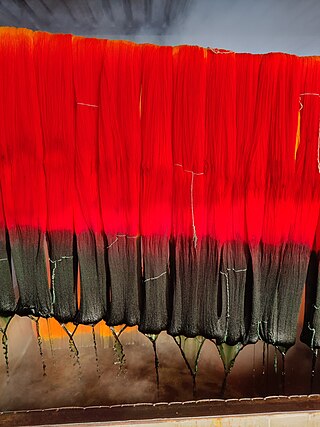
Dyeing is the application of dyes or pigments on textile materials such as fibers, yarns, and fabrics with the goal of achieving color with desired color fastness. Dyeing is normally done in a special solution containing dyes and particular chemical material. Dye molecules are fixed to the fiber by absorption, diffusion, or bonding with temperature and time being key controlling factors. The bond between the dye molecule and fiber may be strong or weak, depending on the dye used. Dyeing and printing are different applications; in printing, color is applied to a localized area with desired patterns. In dyeing, it is applied to the entire textile.
Alagappa College of Technology is an educational institution located in Chennai, Tamil Nadu, India that offers higher education in engineering, technology and allied sciences. The college was established in 1944 and was integrated with Anna University in 1978 from University of Madras as a constituent part of Anna University within its Guindy Campus.

Bhilwara is a city and administrative headquarters in Bhilwara district of the Mewar region of Rajasthan, India. It has been termed as 'Textile city'.

Pali is a city and capital division in Pali district in Indian state of Rajasthan. It is the administrative headquarters of Pali district. It is on the bank of the river Bandi and is 70 km (43 mi) south east of West Jodhpur. It is known as "The Industrial City".

The College of Technology and Engineering (CTAE), is a public engineering college located in Udaipur, Rajasthan, India. It is one of the top ranking engineering institute of the state offering varied courses in engineering.

Tonk district is a district of the state of Rajasthan in western India. The city of Tonk is the administrative headquarters of the district. The district is bounded on the north by Jaipur district, on the east by Sawai Madhopur district, on the southeast by Kota district, on the south by Bundi district, on the southwest by Bhilwara district, and on the west by Ajmer district.

Mohan Lal Sukhadia was an Indian politician, who served as the Chief Minister of Rajasthan state for 17 years (1954–1971). He became chief minister at the age of 38 and was responsible for bringing major reforms and developments in Rajasthan. For this, he is still widely revered as the "founder of modern Rajasthan".
Gulabpura is a town in Bhilwara district of Rajasthan. Mainly industrial town with good educational institutes.
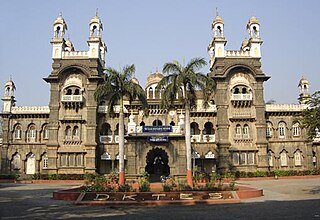
Ichalkaranji ([it͡səlkəɾəɳd͡ʒiː]) is a City in Kolhapur District, Maharashtra. It is situated at the bank of the Panchganga River. Its textile industry has led to the nickname 'Manchester City of Maharashtra'.
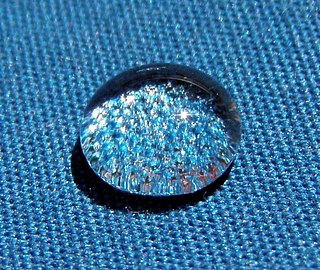
"Technical textile" refers to a category of textiles specifically engineered and manufactured to serve functional purposes beyond traditional apparel and home furnishing applications. These textiles are designed with specific performance characteristics and properties, making them suitable for various industrial, medical, automotive, aerospace, and other technical applications. Unlike conventional textiles used for clothing or decoration, technical textiles are optimized to offer qualities such as strength, durability, flame resistance, chemical resistance, moisture management, and other specialized functionalities to meet the specific needs of diverse industries and sectors.
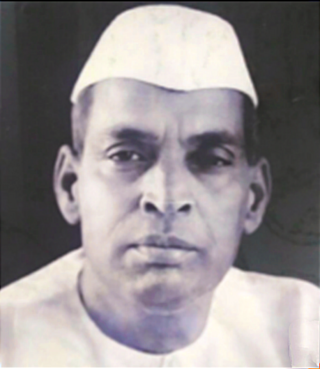
Manikya Lal Verma was a member of Constituent Assembly of India in 1949. He was prime minister of Rajasthan, India before full formation of the state. He was elected to Lok Sabha in 1957 from Chittorgarh and in 1952 from Tonk. He was recipient of Padma Bhushan in 1965.
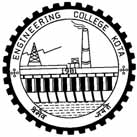
The Engineering College Kota is an autonomous technical institute in Northern India. It houses the headquarters of Rajasthan Technical University and, hence, is referred as University Department of Rajasthan Technical University (UD-RTU). The institute was established in 1981 by the Government of Rajasthan and was named Engineering College, Kota.
DCM Textiles, formerly known as Delhi Cloth & General Mills, is an Indian conglomerate which was initially a textile business which opened its first mill in Delhi. Starting from late 1980s and early 1990s, as a result of legal and financial challenges the company was split into several industry segments under the DCM and DCM Shriram Group branding,, and diversified in to automotive, bioseeds, cement, chemicals, farms, fertilizers, pvc, sugar, textiles, windows and door, yarns, etc. Some of its entities are DCM Textiles Co at Hisar, DCM Sri Ram Mills, Fenesta, etc.
Bahauddin Zakariya University College of Textile Engineering, also known as BZU college of textile engineering, is an institute in southern Punjab, which provides engineering degrees in the field of textile. It is situated on 6-km Khanewal road in Multan, Pakistan.

Shyamoli Textile Engineering College (STEC) is one of the private textile education schools in Bangladesh which operates under the Faculty of Engineering and Technology, University of Dhaka. Admission procedure is regulated by the university and funding is granted by the Department of Textiles, government of the People's Republic of Bangladesh. A new undergraduate course of Apparel manufacturing has been introduced under National University recently.
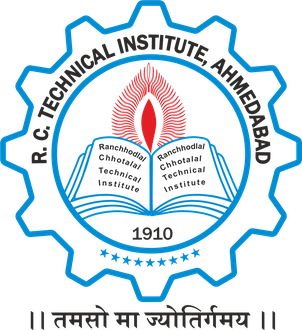
Ranchhodlal Chhotalal Technical Institute was established in the memory of Shri Ranchhodlal Chhotalal, Rai Bahadur CIE by his grandson Chinubhai Madhowlal Ranchhodlal, in the year 1910 at Saraspur, Ahmedabad Gujarat India.

3D textiles are three-dimensional structures made with different manufacturing methods such as weaving, knitting, braiding, or nonwoven, or made with alternative technologies. 3D textiles are produced with three planar geometry, opposed to 2D textiles that are made on two planes. The weave in 2D textiles is perpendicular. The yarn is fed along two axis: length (x-axis) and width (y-axis), while 3D textiles also have a perpendicular weave, but they have an extra yarn with an angular feeding (z-axis) which creates thickness. 3D weaves are orthogonal weave structures, multilayer structures, and angle interlocks. 3D textiles have more manufacturing opportunities, various properties, and a broader scope of applications. These textiles have a wide range of applications, but they are most commonly used where performance is the primary criterion, such as technical textiles. Composite materials, manufacturing is one of the significant areas of using 3D textiles.

RSWM Limited is an Indian textile company which manufactures synthetic and blended spun yarns. Its headquartered in Noida, Uttar Pradesh having registered office in Kharigram, Rajasthan. It is a flagship company of LNJ Bhilwara group.
Narayani Devi Verma was a freedom fighter from Rajasthan in the Indian independence movement. She was the wife of fellow freedom fighter Manikya Lal Verma and together they fought with colonial, imperialist as well as feudal oppression in the erstwhile princely state of Mewar. She had played a key role in the Bijolia movement and also took many steps to promote women’s education. While she was very active in the Praja Mandal Movement, her commitment to Gandhian ideals resulted in her active efforts towards tribal welfare and Dalit upliftment. Even after independence, she remained active in both politics and social service. She was a Rajya Sabha member from 1970 to 1976. She died on 12 March 1977.














